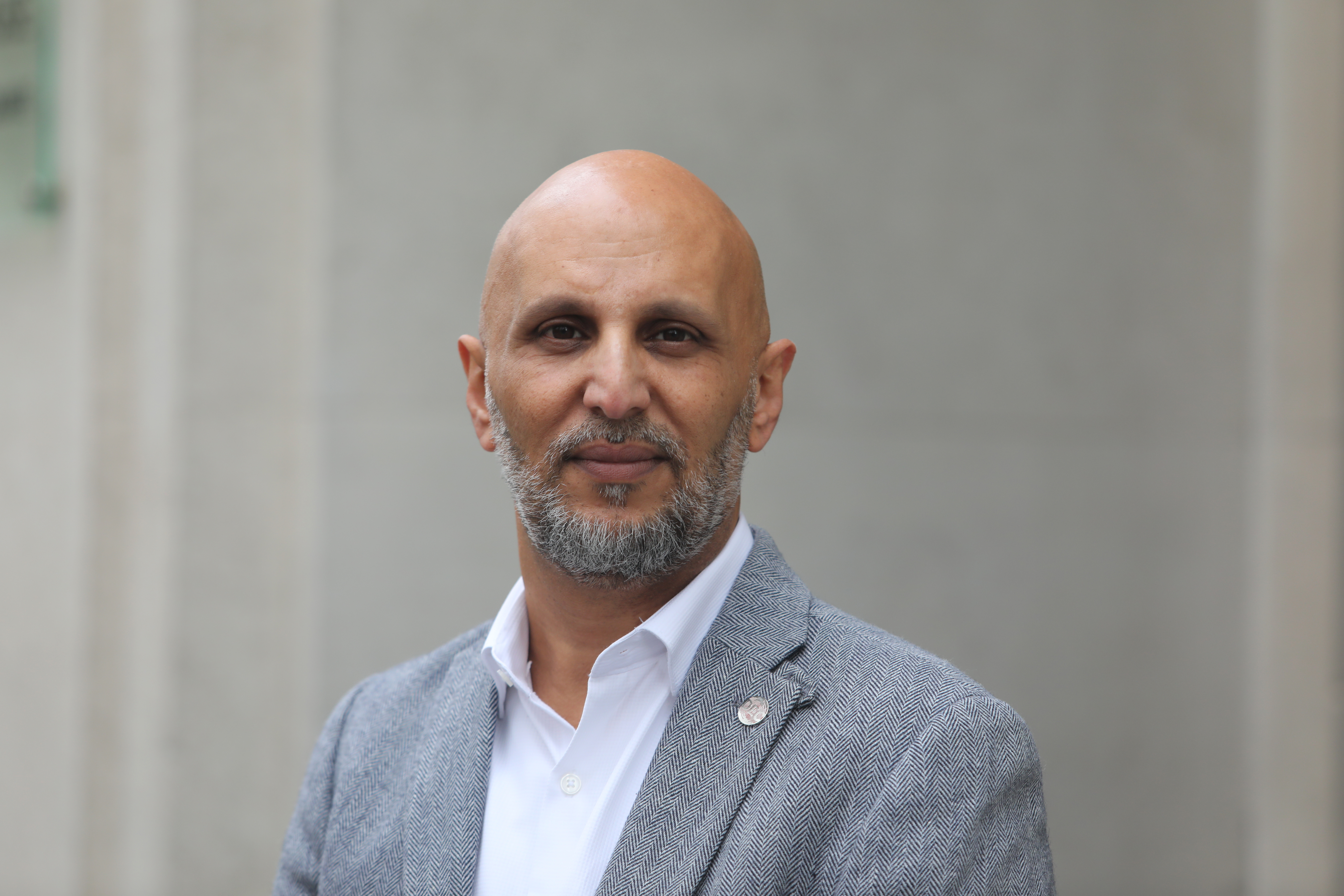As the Ukraine crisis escalates, charitable organisations are stepping up in incredible numbers to help those in need. Melissa Moody speaks to the Disasters Emergency Committee's (DEC) CEO, Saleh Saeed about the charity's work, the necessity of collaboration, and leading through a crisis.
____________________________________________________________________
As I sit here writing this, the conflict in Ukraine has been going on for just over a month, with no end in sight. It’s easy to feel helpless whilst watching events unfold through the news and social media, but many charities have been working day and night to support those fleeing and still in the country.
One of the biggest charity appeals has been through the Disasters Emergency Committee
(DEC), a collaboration between 15 international charities ready for crisis work, who are experts at getting aid to people who need it – fast.
To date, the DEC’s Ukraine Humanitarian Appeal has raised a staggering £260 million; £200 million of which was in the first two weeks alone. “It captured the imagination and the goodwill of the British public and others, to contribute to what is now our second-highest appeal since the Asian tsunami of 2004,” explains Saleh Saeed, CEO of the DEC.
In the midst of his busy schedule, Saeed took time to talk with me about the work the DEC was doing in Ukraine; what goes into putting together an appeal of this magnitude; and what constitutes a crisis.
For the DEC to launch an appeal, there are three criteria: a disaster on such a scale and urgency that there is a need to call for swift international humanitarian assistance, so it wouldn’t respond in places such as the USA, UK or Japan, which would normally have the means to respond themselves. Secondly, does the DEC have member charities active in those countries who can respond effectively, and finally, will the public support an appeal? “For Ukraine, those three criteria were met very quickly, and we were able to launch the appeal incredibly quickly,” notes Saeed.
Collaboration is key
As the leader of an organisation in which partnership is so integral, collaboration is consistently at the top of Saeed’s priority list. For a charity specifically focused on larger ‘disasters’, the threshold for crisis is much higher than perhaps a smaller regional charity which may have been significantly hit by Covid-19, and now the cost-of-living crisis. Nevertheless, the style of leadership and work it takes isn’t all that different.
The DEC has some of the third sector’s biggest names on its roster; the British Red Cross, Save the Children and Oxfam to name a few. That’s in addition to its broadcast partners such as the BBC, ITV, Channel 4, Channel 5 and Sky, which all help to get appeals in front of the general public.
When asked about the challenges he’s faced in his role, Saeed’s response probably isn’t much different to that of other charity leaders. “It always feels like there are never enough funds to complete the last. We’re always fighting what feels like a very uphill battle.” There’s always a gap between growing humanitarian needs, he adds, in places like Yemen, Afghanistan, East Africa and Ukraine, and the ability the charity has to meet those needs. Unfortunately, it’s likely to be a challenge that won’t go away any time soon.
“I don’t like people to think that we’re just there sitting; waiting for a disaster to happen because there’s a lot of other things happening around the world – many are what some would call silent emergencies or forgotten crises, whether that includes Yemen, or the Horn of Africa, which in places are one step away from famine and where millions of people are going hungry,” he says.
Part of the DEC’s mandate is that it must be ready to be called to action at any time, and that takes a significant amount of work. Saeed explains that what people see when the DEC launches an appeal is the ‘tip of the pyramid’.
In addition to a core staff of 20, who are “highly committed experts”, there’s the staff of the charities and agencies it’s partnered with and an extensive list of freelancers and volunteers who “drop everything” to come and support the DEC when it’s called into action.
In 24 to 48 hours, the team grows from around 20 individuals to 70 or more, and that’s partly where the necessity for collaboration and organisation comes in. In order for the team to grow that quickly, planning and preparedness within the partnerships is “key.”
“I think the Ukraine crisis shows exactly how our partnerships work. Because to bring together all those different organisations and individuals in such a short space of time doesn’t just happen. It needs to be planned.
And in a way, when you don’t hear from the DEC, it doesn’t mean we’re not doing anything, it means we’re doing critical work to plan for the next appeal; for the next crisis whenever that happens. “Putting any kind of competition or disagreements aside and really focusing on the humanitarian imperative shows what we can all achieve together, and it’s incredible.”
Leading in a crisis
The DEC by its nature is an organisation responding to disasters, emergencies, and crises around the world, but in theory, the way it works could be applied to smaller charities looking at ways to lead in a crisis. When Covid19 hit, many charities had to turn to a form of crisis leadership and yet had no plan for it and were working on the fly.
“We can’t do what we do in a form of chaos.” Saeed states. “It has to be effectively planned, it has to be responsive, effective and strong. And to do that you need time to prepare and plan. If you start to try and do that while the crisis is happening, it’s just impossible.”
For Saeed, strong leadership is about building a strong and agile team and partnerships around the organisation that are able to collaborate effciently and effectively between them so when a crisis happens, people understand their roles and what they need to do.
“But also a critical element, I think, is building trust,” he says. Not everything goes according to plan and people will have to respond with agility and speed to make sure that the right things happen. In order to do that, you need leaders to build that position of trust amongst the team and partners to be able to move flexibly and quickly.”
Talking to Saeed, it’s clear to me how much he’s valued collaborations and partnerships in not only his own work, but within the DEC’s work – perhaps something more charities can
learn from.
The cost-of-living crisis is expected to hit charities hard with donations in the next six months expected to plummet significantly. It comes hand-in-hand with when the need for charities is expected to rise, with nine in ten leaders believing demand will increase.
“There’s huge strength in collaborations, partnerships and organisations that work together,” he continually reiterates throughout the interview.
Working together may be something that can help the sector, but it also comes with its own issues, too. For example, not every part of the sector is willing to make the changes that are being called for.
Diversity and inclusion forms part of our conversation; a challenge the sector is still actively working on. “Certainly in the networks that I’m in, there is a genuine desire to change. But I also can see that the sector needs to be more reflective of the communities it serves, and I see a genuine desire to grow and develop that bridge,” he says.
A people person
It's obvious Saeed highly values those he works with and he considers himself both privileged and humbled to be able to lead “the national treasure” that is the DEC. It’s an organisation that brings together “so many wonderful and great people” and that has been able to mobilise millions of people across the UK, he says.
“I can’t really say anything that tops that.” Saeed considers himself very fortunate that the people he works with make his life “incredibly easy,” whether it be volunteers or media partners who drop everything on a weekend “or even Christmas Day” in order to help launch an appeal, or the people that the appeals that the DEC serve. “That’s the people who sadly have no choice to live and cope through crises, be it people fleeing their homes in Ukraine or in my own country of birth, Yemen, where it’s been in a state of war for seven or eight years.
“So when I am able to travel and get the opportunity to engage, interact, and meet such incredible people both here in the UK but also across the globe, I think is something that I really cherish and value. It gives me a great deal of reward in the work that we do.
“People often think that there’s a sense of hopelessness or helplessness in countries affected by disasters or conflict, but despite the challenges of seeing people having to cope and live through those experiences, it’s inspirational to see their resilience, their partnerships and the strengths that come out. from such experiences,” Saeed concludes.
Latest News
-
Greenpeace pledges to match London’s diversity in its workforce
-
Former GP and nursing chief to lead Air Ambulance UK's board
-
Uniformed youth charity appoints new CEO
-
Charity body issues funding and disruption warning amid council reorganisation
-
Applications open for Big Give’s women and girls campaign
-
Salvation Army charity shops to stock Aldi products
Charity Times video Q&A: In conversation with Hilda Hayo, CEO of Dementia UK
Charity Times editor, Lauren Weymouth, is joined by Dementia UK CEO, Hilda Hayo to discuss why the charity receives such high workplace satisfaction results, what a positive working culture looks like and the importance of lived experience among staff. The pair talk about challenges facing the charity, the impact felt by the pandemic and how it's striving to overcome obstacles and continue to be a highly impactful organisation for anybody affected by dementia.
Charity Times Awards 2023
Mitigating risk and reducing claims

The cost-of-living crisis is impacting charities in a number of ways, including the risks they take. Endsleigh Insurance’s* senior risk management consultant Scott Crichton joins Charity Times to discuss the ramifications of prioritising certain types of risk over others, the financial implications risk can have if not managed properly, and tips for charities to help manage those risks.
* Coming soon… Howden, the new name for Endsleigh.
* Coming soon… Howden, the new name for Endsleigh.
Better Society

© 2021 Perspective Publishing Privacy & Cookies










Recent Stories